The story of William Browne, commander of the ship Brutus, who died when his ship wrecked on Cape Cod in 1802
Photography and history
I just got back from a massive photo trip to New England, where I photographed beautiful landscapes, seascapes, and historic architecture. While I was snooping through one of the historic old cemeteries in Salem, Massachusetts, I noticed a very old tombstone belonging to the grave of William Browne. It contained an unusual amount of detail, which compelled me to learn more.
In Salem, all of the attention is focused on the history and locations related to the famous Salem Witch Trials of the 1690s. It’s a big draw for tourism, so it’s understandable that those topics get the limelight.
But as a seacoast port, Salem was once America’s wealthiest town because of its shipping, fishing, and merchant industries. Smithsonian Magazine said, “Salem’s sailing ships returned from China and East India (as Americans then called India, Indochina and the Malay Archipelago) brimming with tea and spices, silks and porcelain, ivory and gold dust.” While there was a lot of wealth being made from the shipping trade, residents had to be concerned with the hazards faced by their loved ones going off to sea — unpredictable North Atlantic weather, pirates, and the possibility of shipwrecks.
William Browne, captain of the ship Brutus, was one of those unlucky victims of a weather-related shipwreck. Read on to find out what happened to Browne, who died right before his wedding.
Text from the tombstone of William Browne, Salem, Massachusetts
William Browne
Commander of the ship Brutus,
Belonging to the firm of Crowninshield,
which sailed from Salem on 21 February 1802,
and was shipwrecked on Cape Cod,
in the terrible snow storm
on the night of the following day,
with two other ships, The Ulysses and Volusia,
from the same port.
He perished
with the greater part of his crew,
from the severity of the cold,
after landing near Province Town.
A skillful and active commander,
a well informed merchant,
[the rest was illegible as it ran into the ground]
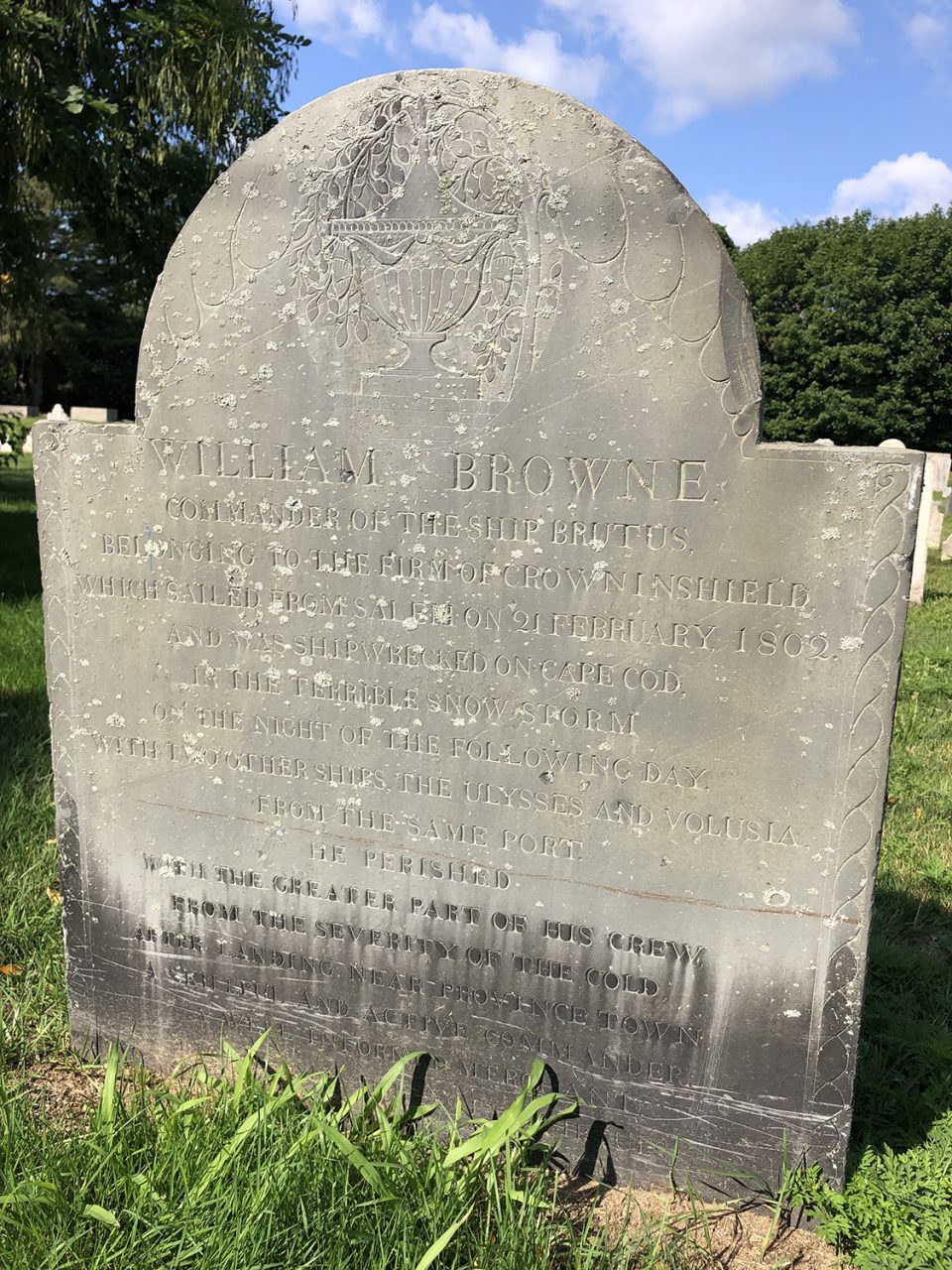
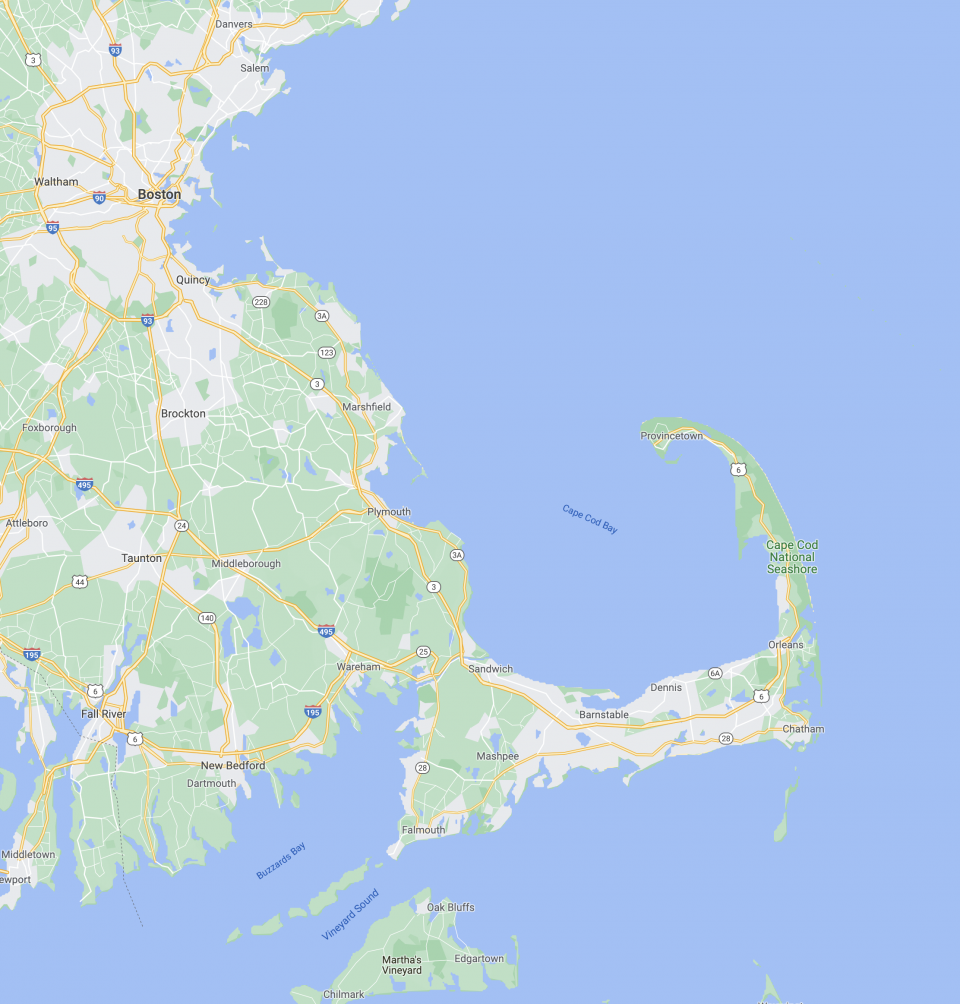
More information about the shipwreck of the ship Brutus from the diaries of Pastor William Bentley, D.D.
In researching the life of William Browne, I didn’t find much information. But a search for the wreck of the Brutus was more fruitful.
Below are entries from the diary of William Bentley, D.D., pastor of the East Church in Salem, Massachusetts. The pastor noted many events on a daily basis, often several unrelated subjects in one entry. I have pulled only those related to the shipwrecks, and removed unrelated information.
You can buy all the published diaries of William Bentley on Amazon here. They are an incredible first person look at the lives of New Englanders in that era. These entries come from volume 2.
What we see over the course of several days, are more detailed updates as news trickles back from wreck site.
Diary quotes begin here:
28. March 1, 1802. This day the melancholy news reached us that the three Ships* which sailed from Salem on Sunday, 21 instant, are shipwrecked upon Cape Cod. The accounts are distressing, but particular events remain unknown.
2. Numerous accounts of Ship wrecks are reported to us. Some are contradicted but additions are made with aggravated Calamities. Capt. Thistle with whom Mr. W. Mason, who has lately been with us with his wife, was cast away on Cape Hatteras. Capt. Brown bilged his vessel going to Washington, N. Carolina. The evils have been round the Globe. We are still waiting with anxiety to hear from our friends at Cape Cod. Capt. George & John Crowninshield are gone by land. Capt. Chever & several others in three vessels have gone by water.
4. News from our Ships* on Cape Cod. The Brutus is totally lost, & the Captain & 11 hands have perished. The Ulysses has bilged, but Crew safe. The other Ship, entirely new is found & will probably be saved. The Brutus the best Sailor, passed a mile be yond the Ulysses before she struck. Such as perished, perished on shore. The Third Ship struck three miles short of the Ulysses, but being entirely new, may be saved. The mate, Mr. Rhue, of the Brutus was saved, & four of the hands, but their names we have not been able to obtain.
*The Ulysses, Brutus, and Volusia.
6. Mr. Blair has arrived from Cape Cod & has afforded us the great alleviation of our distress that no person belonging to our society has perished. Young Rue, Rowell, & Phippen took the precaution of keeping under the bank, & so escaping from the fury of the wind, Snow & Sands, & were saved.
7. Sunday. Tho’ our loss of property has been great yet general joy was expressed that we had no loss of lives from our own society, tho’ distress had reached our neighbours. As Capt. Brown was about to marry in the Society & intended to belong to it, we cannot refuse to feel a large share of the grief his death has occasioned.*
*He was about to marry Priscilla Webb. After the death of Capt. Brown she remained unmarried and lived In a retired manner until her death in 1856, aged 80 years.
12. Arrived in town, W. Rowell, one of the hands from the Brutus. He tells us that the ship struck at 1/2 past 7 on Monday night, that they discharged so much of their Coffee into the sea as to lighten her, that she began to come to pieces at 1/2 past nine & then by the help of the Main mast, all but one reached the shore. That they took their way across the Cape, & at length Capt. Brown failed, & advised them to sit down & die together. They helped him as long as they were able & then left him. He was thin clad. The other second mate failed, Mr. Ayres. He had lost his boots, & so their number continued to diminish till day break. Two of the negroes were found locked together in each other arms. That they first discovered the Ship Volusia but she was so covered with ice, they did not know her. They haled, but no person was on board. At length they found a fence & from that discovered the Light House, at which they had assistance. Young Phippen failed at the fence, but the Light House Keeper brought him in in his arms. The men were found next day & brought to the same house & next day were buried from the Meeting House in Truro. Capt. Browne was buried in Province Town. Young Rowell thinks it would have been impossible to tarry on the beach or to have erected any shelter in their exhausted state. He says that if he stopped only a few minutes he fell down oppressed with sleep, & all the dead were found upon their faces, & the mate with one arm under his head. He froze only his hands, which were without mittens, & uncovered all night. He had on his boots, & suffered no inconvenience from his feet. The Cold by thermometer in Town was below zero, & the snow & sand blew incessantly. Ober, who survived till next day & was taken up alive, was almost choaked with sand & died soon after the attempts to relieve him. He remembered to have heard them walking round him, was buried in snow & stretched out his hand that it might be seen above the snow, but it was not discerned. A boy found him next morning. This is a proof that in snow there is more sure preservation after they were exhausted. The side which was longest bare was irrecoverably frozen. Young Rowell says that he narrowly escaped death by the falling of a beam of the ship while he was below, & had not their lights been put out, & so they had been obliged to retreat they must have all perished, for the last man, finding the mast disengaged by falling into the water, instantly perished among the floating timbers & casks.
[ Note: see the bold text above — emphasis mine — that claims Browne was buried in Province Town. Was this an error, or was the Captain relocated to Salem later?]
14. Sunday. Notes. Hannah Murray, d. of another of her Children & for herself sick. Elizabeth Murray, d. of her G. child, pr. for a son at Sea. Thomas Howell & wife & Children, thanks for the remarkable preservation of their son William in the most -distressing situation of Shipwreck when Captain Browne & the greater part of the Crew perished on Cape Cod, pr. for Sons & friends at Sea.
That’s the end of the quotes from Bentley’s diary. What a remarkable account.
What happened to Captain Browne and the crew after the wreck?
The website Colonial Sense includes extensive details from the fatal night, quoted from their source, “Historic Storms of New England” by Sidney Perley, published in1891. The passage below provides a glimpse of the grim circumstances facing the crew of Brutus after the wreck on Cape Cod. The crew climbed aboard the fallen main mast, which acted as a stable bridge to the shore in the stormy seas.
“This was the coldest night of the winter, the temperature being below zero, and the strong northeast wind pierced them through and through. Captain Brown was very thinly clothed, having lost his thickest garment as he left the ship. He soon succumbed to the intense cold and the fatiguing march through the deep snow, which was too exhausting for his weak limbs to continue further, Mr. Ruee, the first mate, and the other seamen tenderly assisted him as well as they could, but they could not rally his waning strength and will. When they had reached the western side of the bay, about a mile from Provincetown, between that town and Truro, the captain gave up entirely, and soon after expired. It was now nearly midnight. One by one the men began to give out, Jacob Ayers of Manchester, the second mate, a worthy and promising young man, being one of the first to perish in the snow. Soon after, several others of the crew, becoming exhausted, dropped into the drifts, and froze to death.”
That’s the vivid story of how Captain William Browne lost his life after his ship wrecked in a nasty winter storm in 1802.
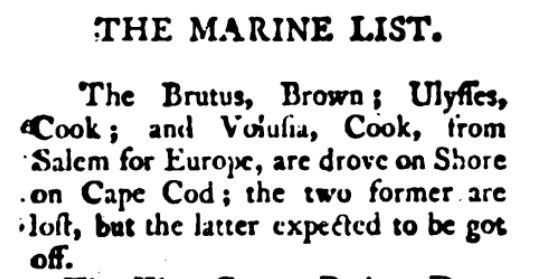
Pictures of the Ulysses and Volusia
Click here to see a gorgeous historic painting of the ships Brutus, Volusia, and Ulysses disembarking on their fateful voyage. According to the inscription on the painting, the ships were bound for Bordeaux, India, and the Mediterranean.
I wasn’t able to locate a picture of the Brutus alone. Below are pictures of the other two ships wrecked with Brutus.
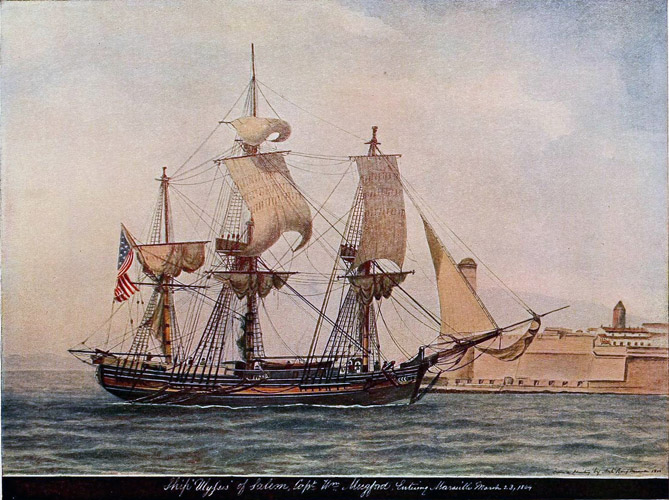
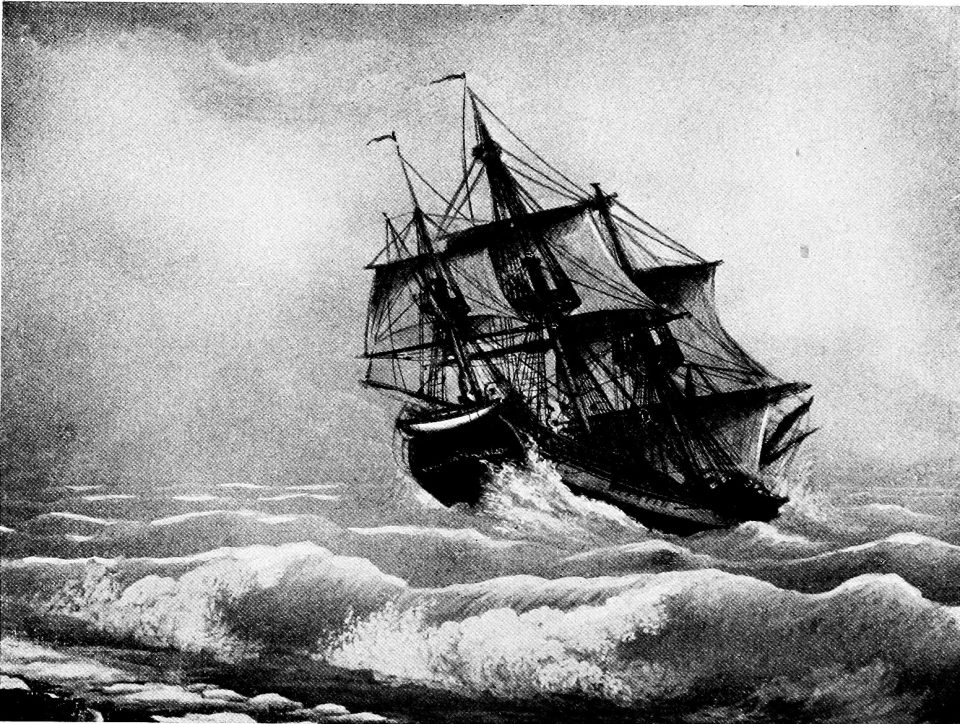
Thanks for reading
Be sure to visit me on Facebook, Instagram or Pinterest, or on my website at keithdotson.com.
~ Keith
Sources
Colonial Sense. New England Weather. “1802 Great Snow Storm of February.”
Deadliest American Disasters and Large-Loss-of-Life Events (10 or More Lives Lost with Notable Exceptions). 1802 — Feb 22-23, Winter Storm, vessels ground, esp. Brutus, exposure, Cape Cod, MA–14. Lorna Jarrett Blanchard.
Lloyd’s List. London. April 20, 1802.
The Diary of William Bentley, D.D., Pastor of the East Church Salem, Massachusetts. Volume 2. January, 1793 — December, 1802. Salem, Mass. The Essex Institute. 1907. Pages 417-420.
Smithsonian Magazine. “Salem Sets Sail.” Doug Stewart. June 2004.
Note: This blog post contains Amazon Affiliate links. I may earn a small commission on qualifying sales.
